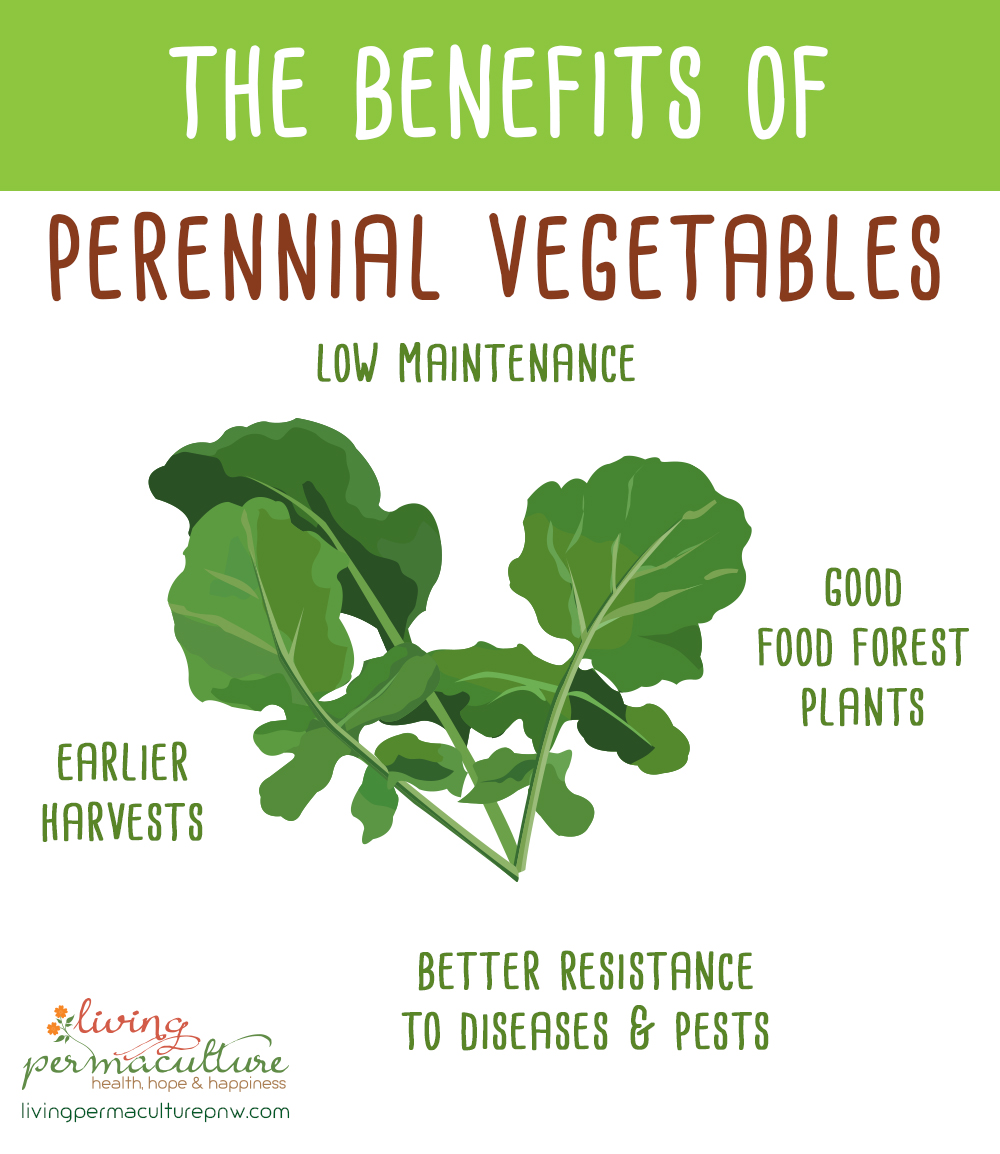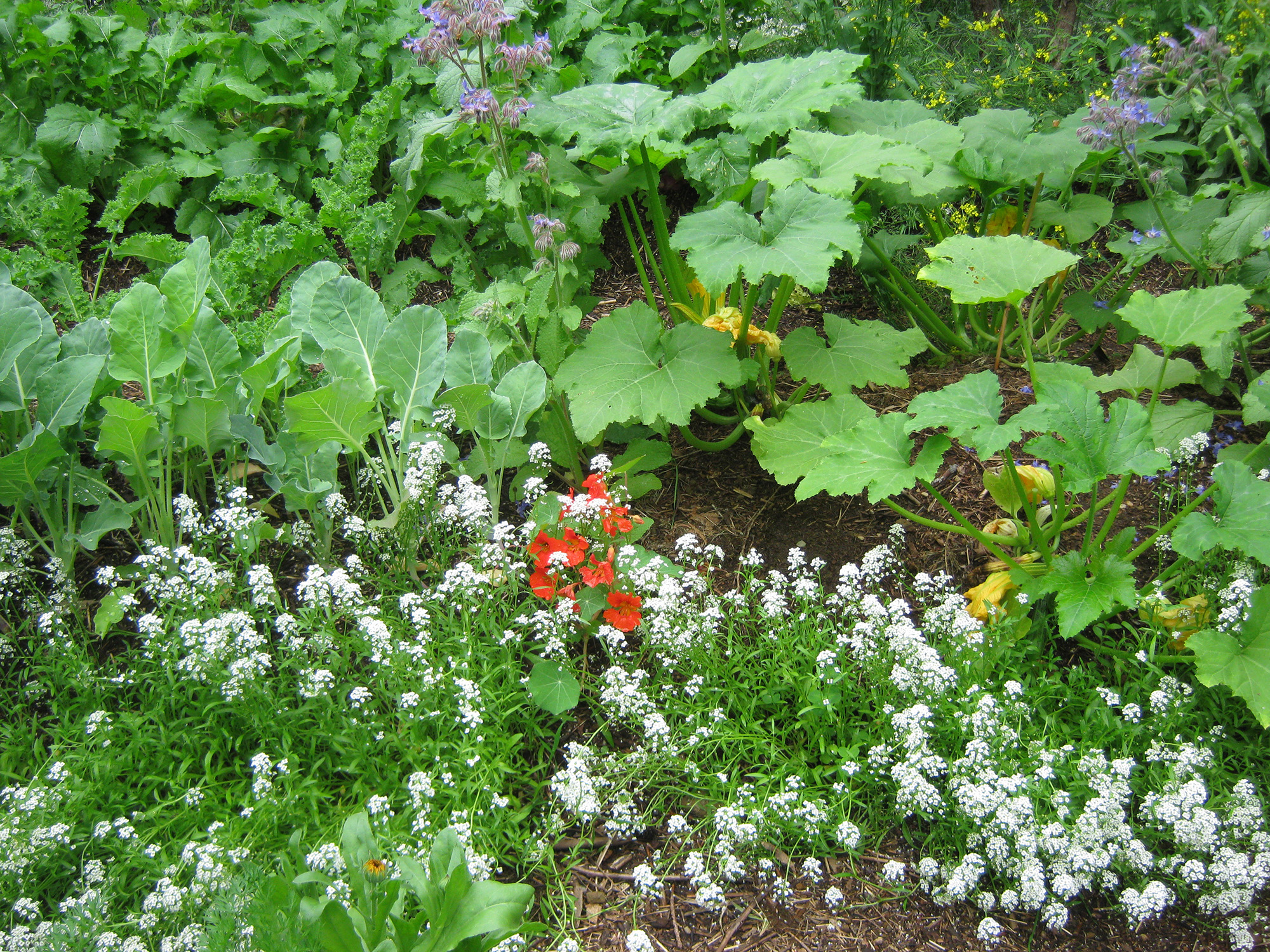
Permaculture advocates creating stable food systems that are resilient in the face of changing weather patterns. Perennial vegetables are excellent to incorporate into your permaculture garden. They add a layer of stability to your garden, and help ensure that there will always be something to harvest.
We know all about perennial fruits and berries – those wonderful jewels of the garden that keep coming back year after year. But are there not perennial vegetables that we can grow? Why, yes there are!
Of course, the list of perennial vegetables you can grow in your garden will depend on where you live. I live in the Pacific Northwest, where the winters are generally fairly mild, and I think there are quite a few perennial vegetables that will do quite well here.
My garden is small, so I don’t have a lot of room for perennials. But when I do, boy oh boy, will I be planting a lot!
The benefits of perennial vegetables
- Low maintenance
- Better resistance to diseases, pests, and drought
- Earlier harvests
- They are excellent candidates for the food forest
Drawbacks of perennial vegetables
- While they offer green leaves earlier in the season than other greens, they often get bitter in summer when they flower.
- Many need to be harvested regularly so that they don’t take over and become a nuisance.
- They can’t be included in a garden rotation.
Perennial vegetables list
The first perennial vegetable I’m going to grow when I have more room is artichokes. I love artichokes. Steamed just right and dipped in mayonnaise. Yum. But artichokes take up a LOT of room, so they won’t fit into this garden. They also probably need more sun hours than this garden gets.
Asparagus is another well-known perennial vegetable that can be grown here. Another is lovage. I planted some lovage last year – some in pots, and some in the ground. I’m happy to see that they are coming back this spring! It is a great green to have for adding to soups, stews, and stir-fries, as well as eating fresh in salads.
Kale can often be grown as a perennial – some varieties being more perennial than others. I’m going to see how long I can keep last year’s kale cropping. It’s still looking pretty sassy out in the garden.
Can we consider rhubarb a vegetable? Well, we might as well. It’s one of those plants that can be planted once, and will continue cropping for many years. I’m not a huge fan, so I don’t have any growing here. But I know that many people love it for pies. And let’s face it, those massive leaves look great in the garden.
Just today (March 30) I picked fresh arugula from the garden. I planted a perennial variety last year, and am very happy to see it coming back. I would also like to get some perennial sorrel happening in that bed. It’s another salad green that I like.
There are some perennial vegetables that I have never tasted, but that I’ve heard of. Nine-Star Broccoli is one that is always mentioned when talk of perennial vegetables arises. I have yet to grow it, but one day it will definitely find its way into my garden.
Good King Henry is another green leafy vegetable that I haven’t had the pleasure of tasting, but would love to grow. Greens are one of my favorite things to grow and eat – they are so versatile – and perennial greens are such a bonus.
I would also love to get my hands on some Caucasian spinach. It is purported to be an excellent climbing plant that puts out green leaves for fresh or raw eating all summer. And it grows in the shade, so it’s a good one for this property.
There are some perennial alliums that I would love to grow. Ramps, wild garlic, and walking onions will definitely find their way into my garden when I have more room. I planted garlic chives this spring, and am looking forward to using those in my stir-fries.
And last but not least, some root crops that I would love to try growing are skirret, Chinese artichokes, and Jerusalem artichokes. Of these, I’ve only tasted Jerusalem artichoke once. But I’m eager to try the others.
Books about perennial vegetables
I know there are many other perennial vegetables I could grow. And when I have space, I hope to try a great many of them, and report back to you about their taste, and how easy or difficult they are to grow here on the west coast of Canada.
If you really want to get into growing perennial vegetables, I have heard that Eric Toensmeier’s Perennial Vegetables is THE book to get. It’s on my list of books to buy.
I remember seeing a video with Eric and his friend, Johathan Bates. They gave Geoff Lawton a tour of their tenth of an acre lot, which was filled with perennials. Very inspiring.
A book came out of that, which is also on my to-buy list – Paradise Lot: Two plant geeks, one-tenth of an acre, and the making of an edible garden oasis in the city. Again, I haven’t read the whole book (just a few chapters), but have been told that it is excellent, and extremely inspiring.
Dreams
Oh, how I dream of an edible oasis. I really do. Actual dreams, in the night. And although I wake up in a rather non-edible place, I retain my dreamy optimism that one day soon I will have my own little slice of paradise.
In the meantime, I will have to satisfy myself with my perennial arugula and lovage; as well as last year’s kale, chard and beet tops, which are still putting out leaves. In a month or so, I should have some baby greens to start munching on from the garden. And it won’t be long after that until the garden explodes into food.
When I have land of my own, and especially when I am planting my food forest, I will want to incorporate as many varieties of perennial vegetables as I can, to help extend my harvests and increase the diversity of my garden and my diet.
While I will still grow many annuals – I mean, I can’t really live life fully without tomatoes – perennial vegetables will make up a big part of my planting scheme.
Tell me about your experience with eating or growing perennial vegetables. Do you have a favorite, or are you still exploring the possibilities, like I am? Leave me a comment below and let me know.
Health, Hope & Happiness
Tracy
This article may contain affiliate links. If you click on a link and make a purchase, I will receive a small commission, at no extra cost to you. See the full Affiliate Disclosure here.
